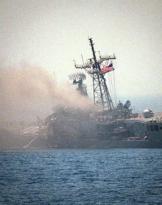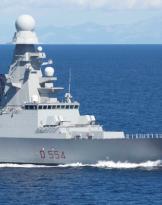Fourteen Italian soldiers wounded during the clashes in Zvecan. Many Italians will wonder “but where is Zvecan?” others, perhaps with some more accurate geographical knowledge, will wonder "but how did it happen?".
Legitimate questions but, perhaps, meaningless. The real question may be “What are NATO soldiers STILL doing there?”, where the important term is “still”.
Amid general indifference, the NATO mission in Kosovo, which will turn 24 in a few days, has surpassed any other Alliance mission in terms of longevity, including the infamous mission in Afghanistan, in which NATO1 she was engaged for 18 years (August 2003 to August 2021).
Lhe longevity of a military mission is never a good sign: indicates that there is a tendency to patch up the lack of a political solution with military arrangements. The too many "never ending" UN operations are plastic demonstration of this, but unfortunately also the NATO interventions in Afghanistan and Kosovo can sadly confirm the validity of this thesis.
As known, the NATO intervention on the ground in Kosovo followed the NATO aerial bombing campaign on Serbia and Kosovo in the period March - June 1999. It was a period of great credibility and great cohesion of the Atlantic Alliance which, starting from December 1995 (after the clamorous failures of the UN first in Somalia and then in Bosnia), it had established itself as the only regional organization that could effectively conduct crisis management operations (at least in Europe).
While the aerial bombing campaign was conducted by autonomous decision of the NAC without a “cover” from the UN Security Council2 (and in fact in an "absolutely accidental" manner in Belgrade the Chinese embassy was also hit) the intervention of the KFOR ground forces (which began on June 12, 1999) was conducted in compliance with UN resolution 1244 of 1999.
Those who, like the writer, entered Kosovo in June 1999 with the first NATO units realized some "inaccuracies" in the CNN account of the situation. He was certainly faced with an inter-ethnic conflict but the "victims" were not all on one side, just as the "executioners" were not even on one side.
La resolution 12443 it was a classic attempt to hit the rim and the barrel, also taking into account the difference of views on this matter between the USA and Russia, both permanent members of the Security Council. Nor at the time could realistically have achieved more and certain contradictions were necessary at least to start the process.
Process that after 24 years, however, still appears bogged down...
The problem of the Serbian communities (who make up almost the entire population north of the Ibar river and who do not recognize their homeland in "Albanian" Kosovo) has always been tackled in terms of safety of these populations but not of acknowledgment of the legitimacy of their aspiration to reunite with theirs (rightly or wrongly, who can review?) they consider to be their true homeland.
The self-proclaimed independence of Kosovo in 2008 (moreover in contrast with the dictates of the resolution 1244) rightly responded to the legitimate expectations of the Kosovar-Albanian population and had at that point become an inevitable step. Moreover, the recognition of this independence by the USA and the European states that have recognized it4perhaps it could have been conditional on the preventive solution of the already critical problem of the Serbian communities in the north.
In 2013, the EU managed to facilitate a first agreement between Belgrade and Pristina on the principles that should govern the normalization of their relations. A large part of the agreement was centered on the realization of “community association of Serb-majority municipalities of northern Kosovo”. An agreement which, however, ten years later has not been applied.
In fact, the international community has not been able to convince the two parties to reach an agreement.
The conviction (more or less founded) of both sides that they still have non-European powers (Russia, on one side, USA and Turkey, on the other) which explicitly or not supported the proponents of the "hard line" did not help.
NATO with KFOR has done an excellent job in these 24 years, but the problem cannot be traced back to the military or security dimension of minorities alone.
It is now necessary to find a political solution and NATO, as such, cannot do this because it does not have the "political capacity" to favor a solution.
The United States has it, which in fact very often dictated the foreign policy line of the Alliance, but the EU really wants to continue to leave the solution to this crisis to American diplomacy, which is truly within Europe ?
Do we really want the Ibar to be perceived as a line of confrontation between NATO and the Serbs?
Russian propaganda certainly finds fertile ground with some Serbian extremists, but this perhaps also depends on the emptiness of the promises that Belgrade believes it has received from Europe.
KFOR's military role is basically contained, its political role is much more relevant, the transition to an EU force would not involve excessive practical problems but it would be an important political signal.
The EU is already present in Kosovo with EULEX, and certainly would have the possibility to manage a force of the small size of KFOR.
The signal, however, would be political. Europe that assumes first-person responsibility for a problem that concerns it. Furthermore, the EU would certainly be perceived in Belgrade (where we still remember the bombings of 1999 and which had already applied for membership in 2009) differently from NATO.
The fact that the EU and the USA are not part of it nor Türkiye, who have big interests in Kosovo, could be an added advantage.
It is clear that the USA and Turkey could put a spanner in the works for a transfer of responsibility to the EU, but perhaps for once the EU (also in relation to what it is doing to support Ukraine) should make itself heard.
1 We are referring to NATO as such, not to individual member countries of the Alliance, including Italy, operating under US command in the framework of the "coalition of the willing" Operation Enduring Freedom.
2 That was the only case in the Alliance's 74-year history of an offensive military operation conducted without a UN Security Council resolution.
3 Resolution 1244, among other things, provided for:
- A temporary administration of Kosovo by the United Nations (UNMIK)
- The return of personnel from the Republic of Serbia to Kosovo to ensure the security of Serbian cultural and religious heritage sites and external border posts (which in fact was never implemented and it was often KFOR that assumed this burden)
- the return to their homes of all refugees (which despite the undoubted efforts of KFOR and the international community has only been possible for ethnic Albanian refugees, while those of Serbian ethnicity have never considered that there were security conditions for the their return, at least south of the Ibar River)
- On the one hand, favor the creation of autonomous political institutions of Kosovo, while guaranteeing the sovereignty and territorial integrity of the Federal Republic of Yugoslavia, in application of the Helsinki agreements of 1975 (objective that is actually difficult to achieve)
- The dismantling of the Kosovar Albanian armed formations, which should not have been transformed into a military-type force (as instead inevitably occurred after the declaration of independence)
- The launch under the guidance of the UN of a peace process that would take as a reference the Rambouillet Accords (never signed by Serbia) for the definition of a future state of Kosovo as a province with great autonomy but not as an independent state.
4 Moreover, some European member countries of both NATO and the EU, such as Spain, Greece, Slovakia and Romania, have never recognized the independence of Kosovo.
Photo: Ministry of Defense












